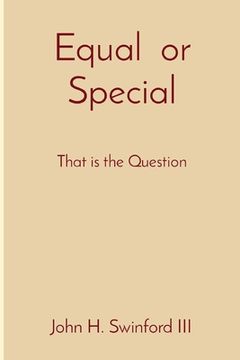Share
Equal or Special: That is the Question (in English)
John H. Swinford
(Author)
·
Self-Help
· Paperback
Equal or Special: That is the Question (in English) - Swinford, John H.
$ 11.19
$ 15.99
You save: $ 4.80
Choose the list to add your product or create one New List
✓ Product added successfully to the Wishlist.
Go to My WishlistsIt will be shipped from our warehouse between
Tuesday, May 28 and
Wednesday, May 29.
You will receive it anywhere in United States between 1 and 3 business days after shipment.
Synopsis "Equal or Special: That is the Question (in English)"
The debate over whether minorities should be treated as special or equal revolves around the concept of achieving equality and addressing historical and ongoing disparities and inequalities. Here are some key points to consider in this debate: Equal Treatment: Treating everyone equally means providing the same opportunities, rights, and protections to all individuals, regardless of their racial or ethnic background. Advocates for equal treatment argue that everyone should be judged based on their merits and individual qualities, rather than their membership in a particular group. They argue that policies should be color-blind and focus on creating a level playing field for all.Recognition of Historical Disadvantages: Advocates for treating minorities as special often argue that historical and systemic disadvantages faced by certain groups necessitate specific attention and policies to address these disparities. They believe that equality cannot be achieved without acknowledging and rectifying the structural barriers that have hindered the progress of marginalized communities. Affirmative action policies, for example, aim to provide opportunities to historically disadvantaged groups.Equity and Fairness: Proponents of treating minorities as special argue that true equality requires taking into account the differing needs and circumstances of individuals and groups. They advocate for proactive measures to ensure fairness and provide additional support or resources to level the playing field and address systemic disadvantages faced by minorities. They argue that true equality is not just about treating everyone the same, but about addressing existing disparities and promoting equal outcomes.Unintended Consequences: Critics of treating minorities as special express concerns about potential unintended consequences. They argue that preferential treatment based on race or ethnicity can lead to reverse discrimination, perpetuate stereotypes, or undermine merit-based systems. They advocate for a "color-blind" approach that focuses on individual qualities and achievements, rather than group identity.Finding a balance between treating minorities as special and ensuring equal treatment is a complex and ongoing process. Many societies strive to create inclusive environments that recognize historical injustices, address disparities, and promote equal opportunities for all individuals. The aim is to achieve a society where everyone can thrive, regardless of their racial or ethnic background, while upholding principles of fairness, justice, and individual merit.
- 0% (0)
- 0% (0)
- 0% (0)
- 0% (0)
- 0% (0)
All books in our catalog are Original.
The book is written in English.
The binding of this edition is Paperback.
✓ Producto agregado correctamente al carro, Ir a Pagar.

